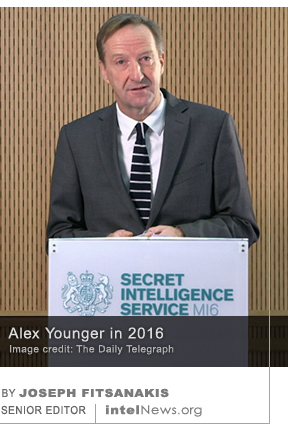MI6 spy chief outlines ‘fourth generation espionage’ in rare public speech
December 4, 2018 1 Comment
 The director of Britain’s Secret Intelligence Service —known as MI6— has outlined the parameters of a new, “fourth generation of espionage”, which he said is needed to combat the “threats of the hybrid age”. Alex Younger, 55, is a career intelligence officer who joined MI6 in 1991, after serving in the British Army. He served as chief of global operations —considered the number two position at MI6— before being appointed director of the spy agency in October 2014. He previously served in the Middle East, Europe, and Afghanistan, where he represented MI6 as its most senior officer in the country following the US-led military invasion of 2001. Until this week, Younger had given a single public address since becoming director of MI6. But on Monday he spoke again, this time at the University of St. Andrews in Scotland, from where he graduated with a degree in economics.
The director of Britain’s Secret Intelligence Service —known as MI6— has outlined the parameters of a new, “fourth generation of espionage”, which he said is needed to combat the “threats of the hybrid age”. Alex Younger, 55, is a career intelligence officer who joined MI6 in 1991, after serving in the British Army. He served as chief of global operations —considered the number two position at MI6— before being appointed director of the spy agency in October 2014. He previously served in the Middle East, Europe, and Afghanistan, where he represented MI6 as its most senior officer in the country following the US-led military invasion of 2001. Until this week, Younger had given a single public address since becoming director of MI6. But on Monday he spoke again, this time at the University of St. Andrews in Scotland, from where he graduated with a degree in economics.
After cautioning his audience that MI6’s methods, operations and people —some of whom “have paid the ultimate price”— must remain secret, Younger said that technological progress has “profoundly changed [MI6’s] operating environment”. Technological change, as well as the degree of interconnectedness, he said, has made the world “dramatically more complicated”. He went on to add that the resulting ambiguity is referred to by MI6 as a constant stream of “hybrid threats”, namely challenges posed by nation-states operating “in the gray spaces of the hybrid era”. They do so in order to probe the West’s “institutions and defenses in ways that fall short of traditional warfare”, said Younger. The British spy chief added that MI6, as “one of the few truly global intelligence agencies” is well positioned to respond to hybrid threats, mostly by augmenting its human intelligence role —using human spies to collect information.
Human intelligence, which is MI6’s core task, “will never change fundamentally”, said Younger, adding that “in fact it will become even more important in a more complex world”. However, it will need to evolve to meet the challenges of the hybrid age. Younger said that MI6 was pioneering a “fourth generation of espionage”, which is the product of the fusion of traditional human skills with “accelerated [technological] innovation”. This new generation of espionage said Younger, relies not on individual work but on operations that are carried out by dynamic teams within and across state agencies. Additionally, the ultimate task of these operations is not simply to know the actions of one’s adversaries, but “to change their behavior”, said the British spy chief. Furthermore, in order to successfully develop fourth generation espionage capabilities, MI6 will have to “ensure that technology is on our side, not that of our opponents”, noted Younger. The spy chief gave an example by referring to the case of the near-fatal poisoning of Sergei Skripal, the Russian former double spy who was allegedly attacked by two Russian military intelligence officers in Salisbury, England, last March. It was “bulk data combined with modern analytics” that exposed the culprits of the operation, he said. But the same methods, which make the modern world more transparent, can posed “a serious challenge if used against us”, warned the MI6 chief.
► Author: Joseph Fitsanakis | Date: 04 December 2018 | Permalink







It’s pleasing to note the MI6 Directors acceptance of the fact that the global enviroment his agency operates is now so very complex and complicated. Nevertheless; i would like to point out that in the case where a nation state is a target i am not so sure it is that easy too ‘change their behavior’
.
Someone once said ” you can’t change a nation in a year – you can’t change a nation in a hundred years’!! – I would imagine one could apply this to – for instance – China.
The director should be congratulated for his stance regarding the importance of HUMINT. The U.S
missed this point some years ago and instead relied mostly on SIGINT, to the degree that the ‘boots of the ground’ assetts deployed were so diluted that they probably – to this day- haven’t managed to restore them too the appropriate levels – particulary in Russia and the Middle East.
It appears that Alex Younger has a very good appreciation of the fine balance required from both a technological and human perspective in order to propell MI6 into this new age.